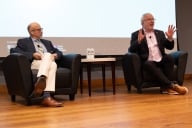You have /5 articles left.
Sign up for a free account or log in.
In what might be a setback for Google’s effort to put to bed persistent privacy and security concerns among existing and potential higher education e-mail customers, the University of California at Davis has announced that it will not be adopting Gmail for its faculty and staff members due to “increased privacy risks that have come to light in recent weeks.”
Outsourcing faculty and staff e-mail to Google might run afoul of the university’s electronic communications policy, said Peter Siegel, the CIO at Davis, and other campus technology officials, in a letter dated April 30. That policy forbids the university from disclosing electronic communications records “without the holder’s consent.” It also proscribes selling or distributing e-communications “that contain personally identifiable information about individuals” to a third party without permission from those individuals.
While it is debatable whether those passages would apply to outsourcing faculty and staff e-mail to Google, the letter said, the concerns that have been raised during the university’s eight-week pilot with Gmail were sufficient to convince officials to rule out a change. Davis, like many other colleges, has already outsourced its student e-mail to Google — and will continue to do so, according to Jeff Keltner, a business developer manager at the company. Most faculty and staff still use the university’s in-house system, called Cyrus, which serves about 12,000 employees.
At a February forum where Siegel discussed the Gmail pilot, the CIO said the university’s in-house e-mail system was fine for the time being, but might require upgrades that the campus would be unwilling to pay for, according to a news item about the event on the Davis Web site. Moving faculty to Google’s service, Siegel reportedly said, would save the campus at least $100,000 per year in licensing, storage and other costs.
Siegel could not be reached Wednesday evening.
Keltner, the Google business developer, said he is not familiar with any other institutions that have rejected Gmail for faculty and staff for privacy reasons after running a pilot, although he said Google would not necessarily have a record if any had. Google takes care to go through contracts carefully with college customers to make sure privacy and security concerns are adequately addressed, he said.
“Most schools we’ve talked to have moved to a place where Google’s security is probably better than theirs,” he said, adding that he did not expect Davis’s decision to start a domino effect among other institutions worried about privacy.
Among the 44 percent of colleges that have outsourced their student e-mail, about 70 percent use Google, according to data collected last year by the Campus Computing Project. Only 8 percent of institutions have outsourced faculty e-mail services, but 21 percent are currently considering it, according to the survey. Among larger universities, the percentage approaches a third. Keltner said Google’s share of that market is about the same — although far fewer institutions have moved their employees on to third-party e-mail clients. (Update, 5/6: This paragraph has been amended to include more relevant data from the 2009 Campus Computing Project survey.)
For the latest technology news from Inside Higher Ed, follow Steve Kolowich on Twitter.








